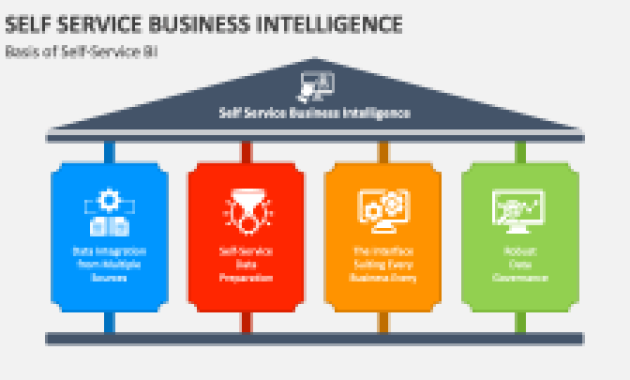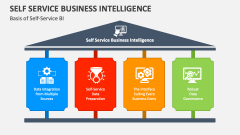
Unlocking Data Insights: How Self-Service Business Intelligence Software Empowers Metric Management
In today’s data-driven landscape, businesses are constantly seeking ways to gain a competitive edge. The ability to quickly analyze data, identify trends, and make informed decisions is paramount. This is where self-service business intelligence (BI) software steps in. It empowers users to manage metrics, gain insights, and drive strategic initiatives. This article explores the capabilities of self-service business intelligence software and its impact on modern businesses.
The rise of data analytics has transformed the way companies operate. Gone are the days of relying solely on IT departments for data analysis. Self-service business intelligence software allows business users to take control of their data. They can explore data, create reports, and build dashboards without extensive technical skills. This shift promotes agility and faster decision-making.
The Core Functionality of Self-Service BI
Self-service business intelligence software offers a range of features. These features facilitate data exploration and analysis. They are designed to be user-friendly and intuitive.
- Data Integration: Connects to various data sources, including databases, spreadsheets, and cloud services.
- Data Modeling: Allows users to transform and shape data for analysis.
- Data Visualization: Creates charts, graphs, and dashboards to present data insights.
- Reporting: Generates reports with customizable layouts and visualizations.
- Data Discovery: Enables users to explore data and uncover hidden patterns.
- Collaboration: Facilitates sharing insights and collaborating with colleagues.
Benefits of Implementing Self-Service BI
Adopting self-service business intelligence software offers numerous advantages. These benefits can significantly improve a company’s performance and decision-making process.
- Faster Decision-Making: Empowers users to access and analyze data quickly. This accelerates the decision-making process.
- Improved Data Literacy: Promotes data literacy across the organization. Employees become more comfortable working with data.
- Increased Agility: Enables businesses to respond quickly to market changes and opportunities.
- Reduced Reliance on IT: Frees up IT resources by allowing business users to handle their data analysis needs.
- Cost Savings: Reduces the need for specialized data analysts and consultants.
- Enhanced Collaboration: Facilitates data sharing and collaboration across teams.
- Better Data-Driven Decisions: Data-driven insights lead to more informed and effective decisions.
Key Features to Look for in Self-Service BI Software
When choosing self-service business intelligence software, several features are crucial. These features ensure the software meets your business needs.
- User-Friendly Interface: The software should be easy to navigate and use. This is crucial for adoption.
- Data Connectivity: Supports a wide range of data sources. This ensures comprehensive data access.
- Data Visualization Tools: Offers a variety of visualization options. This helps present data in a clear and engaging way.
- Reporting Capabilities: Allows users to create custom reports. This provides detailed data analysis.
- Mobile Access: Enables users to access data and dashboards on mobile devices. This enhances accessibility.
- Security Features: Protects sensitive data with robust security measures. This is important for data privacy.
- Scalability: Can handle growing data volumes and user demands. This ensures long-term viability.
- Integration with Existing Systems: Seamlessly integrates with existing business systems. This streamlines data flow.
- AI-Powered Insights: Offers AI-driven features. This helps uncover hidden patterns and trends.
How Self-Service BI Manages Metrics Effectively
Self-service business intelligence software excels at managing metrics. It enables businesses to track, analyze, and improve key performance indicators (KPIs). This leads to better operational efficiency and strategic alignment.
- KPI Tracking: Allows users to define and track KPIs relevant to their business goals.
- Real-Time Monitoring: Provides real-time data updates. This enables quick identification of issues.
- Trend Analysis: Identifies trends and patterns. This helps predict future performance.
- Performance Benchmarking: Compares performance against industry benchmarks. This identifies areas for improvement.
- Data Alerts: Sends alerts when metrics deviate from predefined thresholds. This facilitates immediate action.
Real-World Applications of Self-Service BI
Self-service business intelligence software is used across various industries and departments. It provides valuable insights for making informed decisions. Here are some examples of how it is applied:
- Sales and Marketing: Tracks sales performance, customer acquisition costs, and marketing campaign effectiveness.
- Finance: Monitors financial performance, analyzes revenue, and identifies cost-saving opportunities.
- Operations: Optimizes operational efficiency, tracks production metrics, and manages supply chain performance.
- Human Resources: Analyzes employee performance, tracks employee retention, and manages recruitment efforts.
- Healthcare: Monitors patient outcomes, tracks hospital performance, and improves healthcare delivery.
- Retail: Analyzes sales data, manages inventory, and optimizes store performance.
Selecting the Right Self-Service BI Software
Choosing the right self-service business intelligence software is critical. It requires careful consideration of your business needs and technical capabilities. Here is a guide to help you choose the right software:
- Assess Your Needs: Define your specific data analysis requirements and business goals.
- Evaluate Features: Compare the features of different software options. Ensure they meet your needs.
- Consider Ease of Use: Choose software with a user-friendly interface. This is important for adoption.
- Check Data Connectivity: Ensure the software supports your data sources. This provides comprehensive data access.
- Evaluate Scalability: Consider the software’s ability to handle growing data volumes. This ensures long-term viability.
- Review Security Features: Prioritize software with robust security measures. This protects sensitive data.
- Check Pricing and Licensing: Compare pricing models and licensing options. Choose the most cost-effective solution.
- Request Demos and Trials: Test the software with your data. This ensures it meets your needs.
- Consider Vendor Support: Assess the vendor’s support and training resources. This aids in implementation.
- Read Reviews and Case Studies: Learn from the experiences of other users. This helps inform your decision.
The Future of Self-Service BI: Trends and Innovations
The self-service business intelligence landscape is constantly evolving. Several trends are shaping the future of this technology. These innovations are enhancing its capabilities.
- Artificial Intelligence (AI): AI-powered features are becoming more prevalent. They automate data analysis and provide insights.
- Machine Learning (ML): ML algorithms are used to predict future trends and identify patterns.
- Cloud-Based BI: Cloud-based self-service BI solutions are gaining popularity. They offer scalability and accessibility.
- Data Governance: Data governance is becoming more important. It ensures data quality and compliance.
- Mobile BI: Mobile BI solutions are becoming more sophisticated. This enables data access on the go.
- Embedded BI: Self-service BI is increasingly embedded in business applications. This simplifies data access.
- Data Storytelling: Data storytelling is becoming more important. It makes insights more engaging.
Conclusion: The Power of Self-Service Business Intelligence
Self-service business intelligence software is a powerful tool for modern businesses. It empowers users to manage metrics. It also helps businesses gain actionable insights. By implementing this technology, organizations can make data-driven decisions. They can also improve their operational efficiency and achieve their strategic goals. The ability to harness the power of data is critical for success. Self-service business intelligence provides the tools needed to thrive in today’s competitive environment.
The journey towards a data-driven culture requires careful planning. It also needs the right technology. By embracing self-service business intelligence software, businesses can unlock the full potential of their data. They can also achieve sustainable growth. This is a key factor in the future of business.
[See also: Data Visualization Best Practices]
[See also: Business Intelligence Trends]
[See also: Data Governance in BI]

